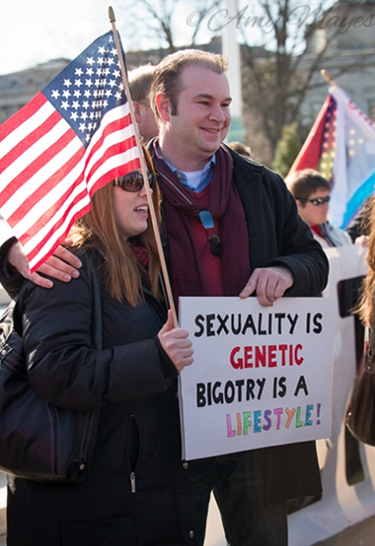 DOMA is dead! Prop 8 is gone! So we're done with the LGBT thing, right?
DOMA is dead! Prop 8 is gone! So we're done with the LGBT thing, right?
In the six weeks since the Supreme Court's historic rulings against DOMA and Proposition 8, I've heard lots of enthusiastic friends say, "So what's next now that we've achieved gay rights?" If you're reading this, your reaction to this statement is probably infuriation. LGBT people know that marriage equality (which, of course, is far from a reality yet) is just the tip of the iceberg. The problem is that most straight people like me don't.
Don't get me wrong: I celebrated June's SCOTUS rulings as much as the next fair-minded American. They're reflective not only of decades of hard, thankless work but of the largest and loudest mobilization around gay rights in history. But thanks to human nature, they also make it easy for people to think that the fight is won and go back to their daily lives, oblivious to the understanding that this is just step one.
As the Movement Advancement Project has pointed out for several years, one of the largest barriers to passing federal employment protections for LGBT workers is that 87 percent of Americans think they already exist. Even more fail to recognize that legal equality does not immediately beget social equality. It's been nearly 100 years since women achieved legal equality in this country, and nearly 50 since people of color did the same, and yet we're still so far from parity on social exclusion, income disparity, or bias for either of these groups. We're in grave danger of the LGBT equality movement going in the same direction.
This is our chance to turn the tide. We have an unprecedented opportunity to turn today's hard-earned enthusiasm for policy change into an impact on the everyday lives of LGBT people. What if we could capitalize on today's success to amplify a new type of civil rights movement, one that creates change not in phases (get the legal rights done now, worry about the social equality later) but in tandem, using the momentum of policy justice to fuel culture change? What if we could build a movement where everyone -- gay and straight, transgender and cisgender, black and white, male and female -- not just the people affected by inequality, takes responsibility for creating a more equitable world?
Straight people are critical to this shift. The 96 percent of us who don't identify as LGBT need to decide not to just go back to our daily lives but to double down on those commitments we made when it was popular back in June. We need to put our voices and actions behind those red-equality-sign Facebook photos we posted. We need to rally those around us, not just to vote for equality but to speak up about it, to talk about it with our families, to be full and active members of the movement. We need to become active allies, not just passive supporters.
How does this shift happen? It starts with meeting straight people where they are: plugging into the communities they already connect to in their everyday lives. In Friendfactor's work to mobilize straight supporters, we've found that people get much more riled up about equality and inclusion when they see that the day-to-day lives of their friends, family members, colleagues, classmates, or teammates are at stake. So we build communities of allies in those settings: in workplaces and universities. We provide a structure for them to become informed, visible, vocal, and active in creating LGBT-inclusive culture in the world around them. And other great organizations do similar work in families, sports teams, schools and congregations. In each of these environments, straight people must step up to the charge, drive in more resources, and take more action -- and they must be supported by their institutions in doing so.
Let's take the momentum of the past few months and turn it into a swell in the LGBT equality movement, not a decline. Let's change the way we fight civil rights movements in this country.
Joanne Sprague is the re-founder and CEO of Friendfactor, a nonprofit that activates straight people to become visible and active allies in their workplace and campus communities. Interested in growing the community of allies at your organization? Contact her at joanne@friendfactor.org.
Photo credit: Amy Mayes